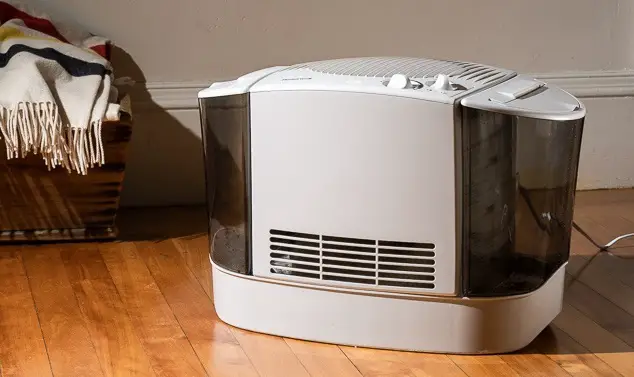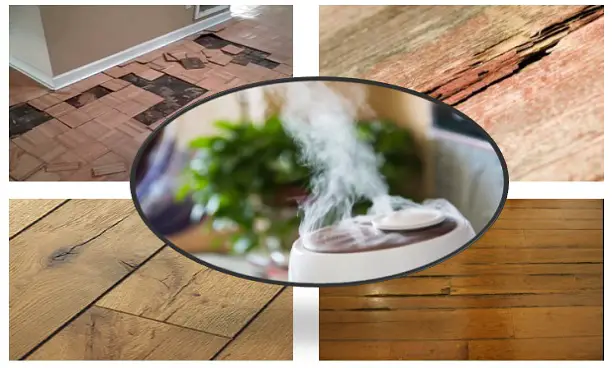
Hardwood floors are lovely, aren’t they? They’re easy to clean, add an element of elegance and class, and can provide a natural, warm look to any space.
What many people fail to realize, though, is that hardwood floors are sensitive to moisture and the environment—requiring just a little bit of extra tender love and care.
The central environmental aspect to keep in mind if you have hardwood floors is humidity.
After all, in nature, the main job of wood is to absorb and circulate water throughout the tree. Even after lumber has been transformed into flooring, wood will still try to do its job.
If wood loses too much of its natural moisture, it will dry up, shrink, and warp. Too much moisture, however, and the soaked wood might warp from over-saturation.
Maintaining a steady indoor climate is the best way to preserve your home and keep your floors from becoming a mountain range—filled with ups and downs as you walk around the house on warped flooring.
Do I Need a Humidifier for Wood Floors?
The best weather conditions for wood are 60-80 degrees Fahrenheit at 30-50% relative humidity.
Less or more than these ranges can affect your hardwood floors negatively, showing signs like gapping, buckling, cracking, splits & checks, cupping, and crowning.
If the area that you live in has less than 30% humidity most of the year, then using a humidifier will help keep your wood from drying out.
Most properly functioning furnace mounted humidifiers will get your home to about 50% humidity and not much more, so you don’t need to worry about your humidifier over-saturating your floors.
On the other hand, if you live in a humid environment, the ambient moisture is probably plenty enough for your wood floors to stay healthy.
Most people feel comfortable at about 50% humidity, so, as a rule of thumb, if you walk outside of a building and physically feel the moisture in the air, you likely live in a climate that does not require a humidifier for your floors.
On the other hand, if your skin tends to dry out often and you need lotion on your elbows most of the year, then consider a whole house console humidifier for your building.
What Amount of Moisture is Safe for Hardwood Floors?
While most HVAC humidifiers do not saturate the air with enough water to damage your hardwood floors, there is such a thing as too much moisture.
50% may be a terrible number for your university test grades, but it’s the perfect humidity level for your floors.
Anything above that and the wood in your home will begin absorbing more of the ambient moisture.
If the wood stays saturated (or wet) for an extended period, it may start to warp or even allow mold to grow. Even small amounts of water, if left unchecked, can cause floor damage.
Most humidifiers that come with a humidistat only saturate the air to about 50-55% humidity.
However, heavy rain, a humid environment, or excessive heat and moisture fluctuations (like in a bathroom shower) can all create excess water and damage your floors.
If you discover standing water or condensation on your hardwood floors, remove the moisture as quickly as possible and inspect the floor.
If the floor is found to be wet or wood has absorbed a little bit of water, then simply keep it dry for a few days, and it will return to normal.
If the wood has soaked up a substantial amount of water, however, such as basement flooding, it is best to have flooring experts come in and professionally dry out the wood before permanent damage is done.
Showers can be especially tricky for hardwood.
If you are worried about your wood cupping & warping due to shower moisture and humidity, consider leaving a fan on in the bathroom.
This will quickly remove the steam post-shower as well as wipe down the wood surfaces with a dry towel as soon as you are done showering.

Issues with Using a Humidifier in Rooms with Wood Flooring
While a humidifier will rarely oversaturate your room, there are still a few issues they can cause if you are not careful.
First, humidifiers require water reservoirs to operate correctly. If these water tanks are faulty, they could leak water onto the floor.
If your humidifier is large, a puddle could form on the ground beneath it without you knowing, thus causing damage before you can fix it.
Additionally, using too large of a humidifier in a small room could cause moisture to form from over-saturation.
It is essential to always use the correct size humidifier and the right setting for the space you are trying to treat.
Finally, large, rapid fluctuations in humidity can be just as damaging as consistently too high or too low humidity.
For this reason, it is essential to keep the climate in your home constant. If the ambient humidity is constant, then leaving the humidifier on is fine.
For climates with rapidly changing humidities, though, it is important to only have the humidifier on when it’s needed and off when it isn’t.
Keeping the temperature and humidity constant despite outdoor factors is crucial for your floors.
Considerations When Using a Humidifier Near Hard Wood Flooring
If you use a humidifier in your home, there are a few more things to remember.
Always keep your humidifier adequately maintained. Neglecting your humidifier may cause its sensor to become faulty, allowing the humidifier to generate too much or too little moisture.
Also, improper maintenance may cause the water tanks to leak, causing standing water damage to your floors.
To detect leaks easily, it is best to place your humidifier on a hard surface so you can see puddles forming easily.
If you leave your humidifier on a carpeted surface or rug, the fabric may absorb the leaks, making it harder for you to notice.
You also want to place your humidifier so the vents point toward open spaces.
Pointing the vents at the walls, curtains, or other fabric, may cause the water to be absorbed by whatever material is next to the vent, causing other water damage problems.
Hardwood floors are a wonderful touch to your spaces. Everyone loves the natural, cozy appearance they give—as if you were living in a mountainside cabin.
So, it’s worth the extra effort to maintain your floors properly so they can extend the life of your home.
Fixing uneven floors is an expensive and difficult task. Keeping the humidity levels right can go a long way to preserving your beautiful floors.
But do remember to use your humidifier for floors properly so that your unit does not damage them anyhow.
Meen Smith is a nurse by profession who loves writing online, spending time with her family and caring for the elderly. She has already worked as an associate editor on various moms, babies, home appliances, kitchen, and healthy living blogs. In her spare time, she also enjoys drawing, reading/writing kindle eBooks and improving her skills a bit.
